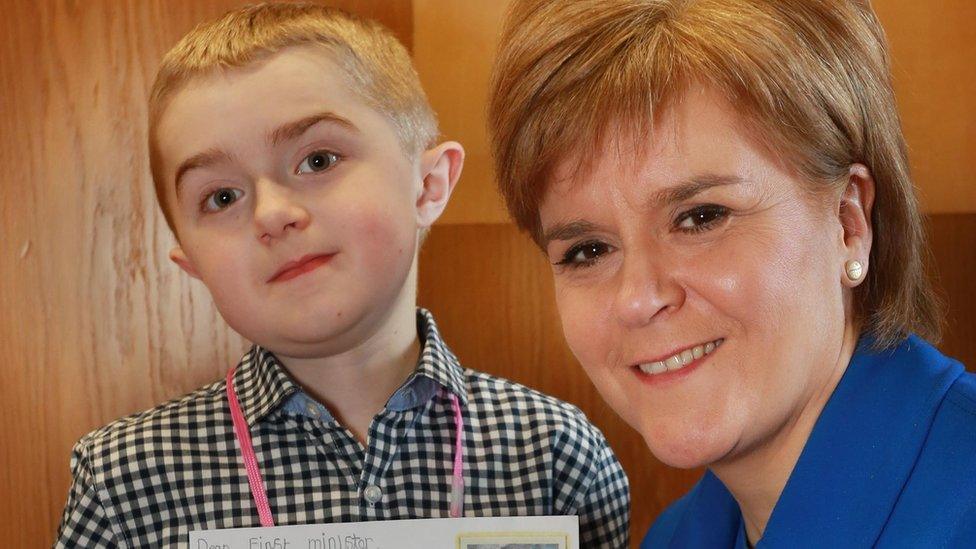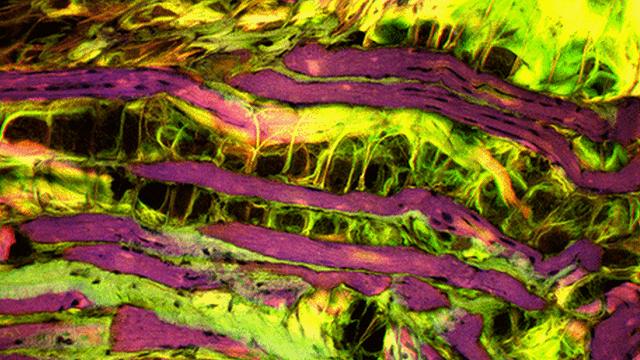Green light for Duchenne muscular dystrophy drug
- Published

Archie Hill, who has Duchenne, met David Cameron last year to appeal for his support for the campaign for Translarna
A drug for treating children aged five and over with Duchenne muscular dystrophy will be available for around 50 youngsters through NHS England.
The medicines regulator NICE has recommended that Translarna (also known as ataluren) be used to help children who will receive the most benefit.
The drug has the potential to delay the loss of the ability to walk in children with the muscle-wasting disease.
Families and charities say they are delighted by the decision.
NICE - the National Institute for Health and Care Excellence - has announced that Translarna should be made available under a "managed access agreement" between the company who makes it, PTC Therapeutics, and NHS England.
This means that it can only be used to treat a small group of certain children - those with Duchenne caused by a particular mutation who are aged five years and over and who are still able to walk.
They will be treated for five years, allowing the company time to collect further data on the drug's efficiency.
The company will now have to agree a cost for the drug which is acceptable to NHS England. Its list price is around £220,000 per year.
Extending walking time
NICE decided to recommend Translarna because there have been promising signs that it could delay the loss of walking for up to seven years.
In a recent clinical trial, none of the 47 children taking the drug lost the ability to walk over a period of nearly a year, compared with 8% of children on a placebo.
Children with the progressive disease typically become dependent on a wheelchair by the age of 12.
Duchenne muscular dystrophy (DMD) is a severe progressive disease linked to the X-chromosome, affecting mostly boys.
There are 60 to 70 children born with the disease in England each year and around six to nine of them are affected by the "nonsense" mutation relevant to this drug.
Translarna works by allowing the body to ignore the mutation in the DNA and continue to produce the protein dystrophin, which protects the muscles from wasting.
The charity Muscular Dystrophy UK has been fighting for the drug to be made available on the NHS for some time.

Archie met the prime minister to ask for his support in making Translarna available on the NHS
'Clearer picture'
Robert Meadowcroft, chief executive of Muscular Dystrophy UK, said the announcement was "wonderful news and a true victory for the families".
And he said the agreement would allow them "to gain a clearer picture of the full potential of Translarna, and, crucially, to buy precious time for other promising potential treatments to reach licensing stage. It is a chance to transform childhoods".
However he said he was concerned that it could take months for NHS England to implement the agreement and get the drug to clinic, having already waited 18 months for the decision.
He said: "We call on NHS England to act with the urgency and resolve that these children and their families deserve."
Sir Andrew Dillon, chief executive of NICE, said the decision had been considered carefully because of the costs involved.
"NICE acknowledges that it represents a significant cost to the NHS at a time of increased pressure on funding and has considered this carefully against the uncertainties of its potential long-term benefits.
"This is why the committee has recommended the drug be made available for an initial period of five years, under strict conditions, to allow more data to be gathered on its efficacy, before the guidance is reviewed and a further decision made on whether funding should be continued."
No commitment
Dr Peter Jackson, chair of the NICE highly specialised technologies evaluation committee, said the next five years would be crucial.
"The committee could not have recommended the drug without the agreement to limit its use to five years while more data is gathered.
"If the data shows that the drug is less effective in the longer term and doesn't provide good value, the NHS is not committed to funding the drug in the long-term."
Final guidance from NICE on Translarna will be published towards the end of May 2016 and NHS England then has three months to make it available to its patients.
Recently, the Scottish Medicines Consortium (SMC) denied automatic access to the drug through the NHS in Scotland.
In 2014, Translarna became the first drug addressing a genetic cause of Duchenne muscular dystrophy to be approved in the EU.
It has been available to families in a number of European countries for over a year.
- Published28 January 2016

- Published24 May 2014

- Published3 September 2013
